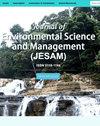印度尼西亚苏拉威西岛东南部北布顿县拉胡莫科流域管理的可持续性现状
IF 0.3
4区 环境科学与生态学
Q4 ENVIRONMENTAL SCIENCES
引用次数: 0
摘要
拉胡莫科流域目前的管理仍然是传统的。主要是在农业用地管理中,实践中没有运用水土保持的原则。这还不足以支持人们的生活,使生物、物理、社会、经济和体制层面无法支持拉胡莫科流域的可持续性。本研究旨在分析印度尼西亚东南苏拉威西省北布顿县拉胡莫科流域的可持续性以及对其可持续性产生多维影响的因素。所使用的方法是流域快速评估,采用多维尺度技术的渔业快速评估。拉胡莫科流域管理在物理、经济和体制方面的可持续性状况仍然较差,而在生物和社会方面则相当可持续。有助于提高流域管理可持续性的一些杠杆属性包括农业作物种植模式、森林植物多样性、受保护生物的管理、河流生物群、森林覆盖管理、水土保持技术、农业基础设施、径流、沉积、水质、教育水平、,社区关系模式、冲突状况、土地依赖性、农业生产力、获得资源、进入市场、资源管理规划和流域管理规则的全面性。本文章由计算机程序翻译,如有差异,请以英文原文为准。
The Sustainability Status of Lahumoko Watershed Management, North Buton Regency, Southeast Sulawesi, Indonesia
The current management of Lahumoko Watershed is still conventional. Mainly, in agricultural land management, the practices do not use the principles of soil and water conservation. This is not sufficient in supporting people’s lives so that the biological, physical, social, economic and institutional dimensions do not support the sustainability of the Lahumoko Watershed. This study aimed to analyze the sustainability and the factors that have multidimensional influence on the sustainability of the Lahumoko Watershed, North Buton Regency, Southeast Sulawesi, Indonesia. The method used was Rapid Appraisal for Watersheds, adopted from Rapid Appraisal for Fisheries using the Multi-Dimensional Scaling technique. The sustainability status of the Lahumoko Watershed management for the physical, economic and institutional dimensions were still less sustainable, while the biological and social dimensions were fairly sustainable. Some leverage attributes contributing to improving the sustainability of watershed management were patterns of agricultural crop cultivation, plant diversity in forest, management of protected organisms, river biota, management of forest cover, soil and water conservation technologies, agricultural infrastructure, runoff, sedimentation, water quality, education level, relationship pattern of the community, conflict status, land dependency, agricultural productivity, access to resources, access to markets, resource management planning and rule comprehensiveness for watershed management.
求助全文
通过发布文献求助,成功后即可免费获取论文全文。
去求助
来源期刊

Journal of Environmental Science and Management
ENVIRONMENTAL SCIENCES-
CiteScore
0.90
自引率
0.00%
发文量
10
审稿时长
2 months
期刊介绍:
The Journal of Environmental Science and Management (JESAM) is an international scientific journal produced semi-annually by the University of the Philippines Los Baños (UPLB).
JESAM gives particular premium to manuscript submissions that employ integrated methods resulting to analyses that provide new insights in environmental science, particularly in the areas of:
environmental planning and management;
protected areas development, planning, and management;
community-based resources management;
environmental chemistry and toxicology;
environmental restoration;
social theory and environment; and
environmental security and management.
 求助内容:
求助内容: 应助结果提醒方式:
应助结果提醒方式:


